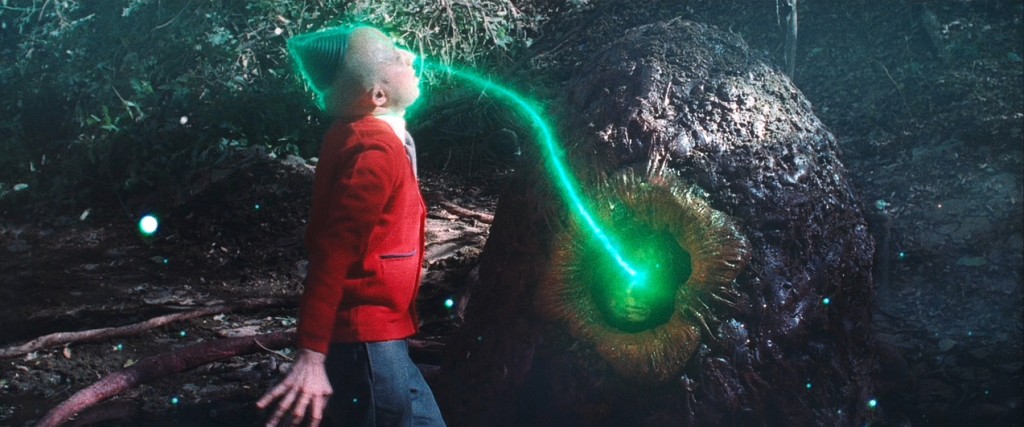In 2016, Park Chan-Wook’s psycho-sexual thriller “The Handmaiden” —one of the best films of the year— included among its visual oddities a POV shot from the perspective of a vagina. In 2017, musician and producer Steve “Flying Lotus” Ellison’s “Kuso” shared the view from inside George Clinton’s anus; while one could see this as indicating a spiritual kinship between Park and Ellison’s films, it’s safe to say that “Kuso” is far from the year’s greatest.  Much of the early buzz around “Kuso” centered on its Sundance premiere, where the walkouts it inspired were sometimes discussed more than its content. This mass revulsion seems to be Ellison’s desired reaction, as every aspect of the film is a carefully crafted provocation. The characters are sad creatures living lonely existences in a Los Angeles ravaged by an earthquake that somehow led to denizens being deformed with boils, blisters, and sores. Child abuse, rape, and deviant sexual behavior are common practices for most of these characters. Even the sets are gauged to disgust, liberally smeared with a substance one can only hope is chocolate. The gross-out assaults are meant to inspire shock in some and laughter in others, but their ubiquity just grows tedious as the film progresses. Despite these overwhelmingly juvenile trappings, Ellison’s impulse toward the scatalogical is the first place one can see that the seeds of an excellent filmmaker planted deep within him. The production design is full of biological grotesqueries —stumps growing out of the ground with yawning openings and large, Muppet-y creatures with toothy, misshapen mouths— that can best be described as anal or vaginal in nature. These visuals are mirrored in multiple instances of frames within frames, whether a shot of a TV screen or the tunnel that subterranean Angel (Mali Matsuda) enters. Featuring frames within frames reflects the structure of the film, which alternates at will between four ongoing narratives. Ellison also explores common themes bridging these stories. The most prominent involves how the deformed humans of this alternate LA deal with troublesome co-habitations; the discord between aspiring rapper B (The Buttress) and her ‘trans-dimensional roommates’ Kazu (Hannibal Burress) and Mazo (Donnell Rawlings) provides the film’s funniest segments, while the sexual relationship between Missy and Kenneth (Iesha Coston and Oumi Zumi) and the boil living on Missy’s neck (the voice of David Firth) is “Kuso” at its most revolting. The novice director also wears his influences on his sleeve, with overt visual references to the films of David Lynch, the dadaist media criticism of Tim Heidecker and Eric Wareheim, and traditional sitcoms. The fact that Ellison is skilled enough to employ pervasive visual motifs, explore themes across several narratives, and display his great taste in role models shows that he has the raw skill necessary to make a great, truly unique film; however, employing these talents simply to generate offense in “Kuso” wastes them. “Kuso” is currently in theaters in Los Angeles & available for streaming on Shudder.
Much of the early buzz around “Kuso” centered on its Sundance premiere, where the walkouts it inspired were sometimes discussed more than its content. This mass revulsion seems to be Ellison’s desired reaction, as every aspect of the film is a carefully crafted provocation. The characters are sad creatures living lonely existences in a Los Angeles ravaged by an earthquake that somehow led to denizens being deformed with boils, blisters, and sores. Child abuse, rape, and deviant sexual behavior are common practices for most of these characters. Even the sets are gauged to disgust, liberally smeared with a substance one can only hope is chocolate. The gross-out assaults are meant to inspire shock in some and laughter in others, but their ubiquity just grows tedious as the film progresses. Despite these overwhelmingly juvenile trappings, Ellison’s impulse toward the scatalogical is the first place one can see that the seeds of an excellent filmmaker planted deep within him. The production design is full of biological grotesqueries —stumps growing out of the ground with yawning openings and large, Muppet-y creatures with toothy, misshapen mouths— that can best be described as anal or vaginal in nature. These visuals are mirrored in multiple instances of frames within frames, whether a shot of a TV screen or the tunnel that subterranean Angel (Mali Matsuda) enters. Featuring frames within frames reflects the structure of the film, which alternates at will between four ongoing narratives. Ellison also explores common themes bridging these stories. The most prominent involves how the deformed humans of this alternate LA deal with troublesome co-habitations; the discord between aspiring rapper B (The Buttress) and her ‘trans-dimensional roommates’ Kazu (Hannibal Burress) and Mazo (Donnell Rawlings) provides the film’s funniest segments, while the sexual relationship between Missy and Kenneth (Iesha Coston and Oumi Zumi) and the boil living on Missy’s neck (the voice of David Firth) is “Kuso” at its most revolting. The novice director also wears his influences on his sleeve, with overt visual references to the films of David Lynch, the dadaist media criticism of Tim Heidecker and Eric Wareheim, and traditional sitcoms. The fact that Ellison is skilled enough to employ pervasive visual motifs, explore themes across several narratives, and display his great taste in role models shows that he has the raw skill necessary to make a great, truly unique film; however, employing these talents simply to generate offense in “Kuso” wastes them. “Kuso” is currently in theaters in Los Angeles & available for streaming on Shudder.





